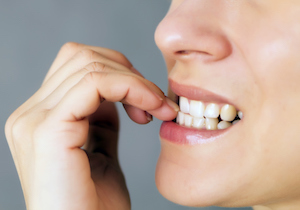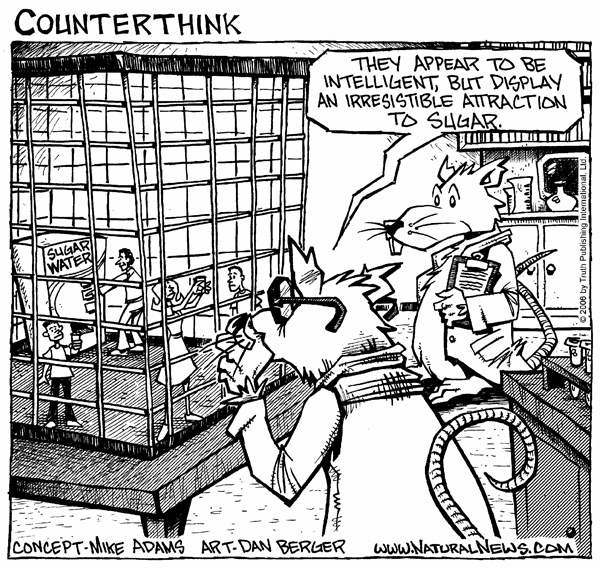Stay Informed
Popular Articles
- Hiatal Hernia: Hidden Cause of Chronic Illness
- Small Intestinal Bacterial Overgrowth (SIBO)
- Applied Lymphology: Unlocking the Secret to Pain Relief
- An Introduction to Constitutional Iridology
- The Low Down on Liver Detoxification
- An Energetic and Emotional Approach to Cancer
- Fat Facts
- Marrow in the Bones
- Blood Type and Nutrition
- Cardiac Herbs: Beyond Hawthorn
Quick Search
The School of Modern Herbal Medicine




Remedies for Anxiety
- 2/9/2008
 Here are some remedies that can help relieve anxiety.
Here are some remedies that can help relieve anxiety.
Balancing Adrenal Function
Adrenal problems are one of the most common issues that come up with my clients. Most people in our society are under a great deal of stress and don't know how to deal with it. However, part of the reason they don't know how to deal with it is because their adrenal glands aren't functioning properly.
I have observed that people with healthy adrenal glands are usually able to deal with stressful events in a calm and deliberate manner. However, most people in our society don't have healthy adrenal glands. Sugar, caffeine and other stimulants all stress the adrenal glands. Chronic inflammation also stresses adrenal function. Poor nutrition, especially a lack of water-soluble vitamins (particularly C and pantothenic acid), deficiencies of minerals like zinc and amino acids like l-tyrosine, and the lack of healthy fats (including low cholesterol), will also result in poorly functioning adrenal glands.
The two supplements I rely on the most for balancing adrenals are Adrenal Support and Nervous Fatigue Formula. People with chronic anxiety and nervousness, and especially people suffering from post-traumatic stress disorder, almost always need Adrenal Support. Sometimes, they need an even stronger adrenal glandular.
People who are mildly anxious, emotionally sensitive, tired and suffering from restless sleep usually benefit from Nervous Fatigue Formula. People who have been on Adrenal Support for a couple of months will often wind up switching to Nervous Fatigue Formula as their adrenals get stronger.
Besides these two stand-bys, I have also used licorice root, pantothenic acid, vitamin C and Nutri-Calm to nourish depleted adrenal glands. Licorice is especially useful for children with anxiety. Pantothenic acid will often “jump start” exhausted adrenals. Nutri-Calm works both on the nerves and the adrenals and is helpful for people who are restless and constantly “on the go.”
Sometimes people just need the adrenals balanced a littleÄÂcalmed down a bit. For this, I usually use adaptogens. I often find that Eleuthero Root is sufficient, but I've also used Suma Combination and occasionally AdaptaMax to calm adrenal function.
 Blood Sugar and Anxiety
Blood Sugar and Anxiety
Closely related to the issue of adrenal function is hypoglycemia. With all the focus in recent years about metabolic syndrome X and the glycemic index, we sometimes forget that hypoglycemia (low blood sugar) is the precursor to type II diabetes. Eating lots of refined sugar and other simple carbohydrates results in a sugar “high” followed by a sugar “low.” Sometimes, when the sugar is low, the adrenals kick in gear to bring the sugar back to normal levels. This will generate anxiety.
So, another important factor in stabilizing the person's mood is to get them on a good diet with complex carbohydrates. This really helped my mother and it has helped many other people I've known who suffer from anxiety and emotional problems.
Nervines and Anxiety
I mentioned that sometimes a good nervine formula is needed. For people who are really “uptight,” I suggest lobelia or kava kava because they are both strong muscle relaxants. If it's just nervousness, then Stress-J is a good choice. If the person is really “shaky,” then magnesium may be helpful. If depression is a factor, then consider Mood Elevator.
These supplements can make big differences rather quickly. For example, shortly before she passed away, my mother slipped on the stairs and chipped her kneecap. When my mom was discharged from the hospital, I went to stay with her for a couple of weeks to help her. I knew that her anxiety was going to really “get to me” if I didn't do something about it, so I gave her lots of licorice root and kava kava. (I didn't have Adrenal Support at the time.
Two of my cousins who lived nearby and helped watch after my mom, would come by for a visit periodically. They took me aside and asked me what I was doing that made my mother so calm. When I told them, they said, “Please keep doing it, we've never seen your mom this calm.” (By the way, both of these cousins buy herbs from me from time to time now.)
While we're on the subject, I might also mention that I've seen nervines like kava kava and lobelia really help with panic attacks. Once, I encountered someone who was in such a state of anxiety that they were experiencing tetany—their muscles were frozen and they couldn't open their hands. I walked them through the situation by giving them doses of liquid kava and lobelia every few minutes while coaching them to breathe slowly and deeply. I was able to successfully help them out of the attack in about 10 minutes.
Many years ago, I also had an employee suffer a panic attack at work. By coaching them to breathe slowly and deeply and giving them doses of liquid lobelia every couple of minutes, I was able to get them back to normal, again in about 10 minutes. Later, by giving them flower essences and Nervous Fatigue Formula for their adrenals, I was able to help them greatly reduce their overall anxiety.
Another great remedy for anxiety is flower essences. Rescue Remedy (Bach), Five Flower Remedy (FES) or Distress Remedy (NSP) can all be used to reduce feelings of stress and anxiety. Also consider the Be Courageous and Be Response-Able flower essence blends I created for Nature's Sunshine (NSP).
What I learned about anxiety from working with my mom and others has also been helpful for me from time to time. I've gone through some periods of great stress in my life, which created a lot of anxiety. By nourishing my adrenals and using relaxing nervines, I have been able to get through these incidents and restore emotional balance to my life. Of course, working on the second component of anxiety management has also helped. So here are some tips for resolving this second aspect of anxiety.
The Mental and Emotional Component
 The adrenal glands are associated with the solar plexus, the body's center of gravity. In other words, they help a person stay “centered.” A person who is “centered” is in touch with the inside of their being and is able to “choose” how to respond to external pressures and stress. In other words, they are able to choose whether to fight a problem, flee from it, ignore it or otherwise resolve it. In short, they are able to choose an appropriate action (not reaction) to the problems of life.
The adrenal glands are associated with the solar plexus, the body's center of gravity. In other words, they help a person stay “centered.” A person who is “centered” is in touch with the inside of their being and is able to “choose” how to respond to external pressures and stress. In other words, they are able to choose whether to fight a problem, flee from it, ignore it or otherwise resolve it. In short, they are able to choose an appropriate action (not reaction) to the problems of life.
The so-called “fight-or-flight” response is actually much more complicated than just fighting or fleeing. It's just a metaphor, based on the idea of being attacked by a wild animal. Whether one fights or flees from an attacking wild animal, one is physically taking some kind of self-protective action. The key isn't in actually fighting or running away, it's in being able to choose an action and take it.
I believe that one of the reasons so many people suffer from anxiety in our society is because we encounter so many stresses where a physical action cannot be taken to relieve the stress. One example is being stuck in a traffic jam when one is late for an important appointment. Physical action is just not possible. One can't fight the other cars or flee the traffic jam.
Another example would be going to court. I don't know if you have ever had to be in court for any reason, but if you have, you probably understand what a stressful experience it is and what anxiety it causes. Again, physical action is not an appropriate response in a court. So, it is difficult to discharge the energy created by the stress response into a constructive physical action. Thus, a high state of anxiety is created that stays with you.
My mom used to shake her arms in a certain way and rub her face. As an adult, I noticed that I wanted to perform a similar action during a period of anxiety. For a moment, I thought, “Oh, no, I'm acting like my mother,” but then I decided to tune into my body and figure out what it was my body really wanted to do.
I discovered that I was really angry and what I really wanted was to hit something. This response was inhibited in me, so I was shaking, stuck between action and inhibition. Thus, like the deer in the headlights, my ability to make a choice of physical action was frozen, thus creating chronic anxiety. My arms were shaking because the kinetic energy wanted to go someplace, but was being inhibited.
When I let go of the urge to hit something by beating the living daylights out of a pillow, it allowed me to complete the movement my arms wanted to make. This immediately relieved my anxiety. So, I believe that an important part of relieving anxiety is finding ways to channel the adrenaline rush behind it into some kind of physical activity.
Healthy Ways to Release Anxiety
At one time, people had more physical outlets for their stress. Native people would drum and dance. They were allowed to “whoop and holler” to create loud vocalization to expel energy. Certain kinds of work also allowed for this same discharge of anxiety. Chopping wood, for instance, makes the same movements that striking out at someone does, so it creates a “fight” kind of discharge. If you've never tried it, chopping wood is a great way to release both anger and anxiety.
The fact is, most of us just aren't physically active enough. The stress we feel has no place to go. So, if you suffer from anxiety, get up and move. Running or even walking will help. If you're stuck in a traffic jam, make sure the windows are rolled up and scream. It doesn't hurt to release the tension as long as you aren't releasing it by attacking or hurting yourself or others. Just remember that making some kind of a choice that involves physical action helps transform the nervous energy of anxiety into the action. Not being able to make a choice of action will cause anxiety to mount.
Coming back to my mother, I'm sure that one of the reasons she was such an anxious person was because she was so afraid of making mistakes. My mother believed that “one mistake can ruin your whole life.” (That's a direct quote.) No wonder she was anxious. It's tough to act when you have to worry so much about whether your action is right or wrong.
In retrospect, I think much of the anxiety in my life came because I was torn between two courses of action, both of which seemed “wrong” to me. I did learn a little secret that helped me get past this and that is that life is never a choice between just two options. “Fight” or “flee” are not the only options.
What I learned to do was pray for help in finding the “third” path--the path that would bring me inner peace. When I find the course of action that makes me feel at peace, I know I've found the right path. Following that path takes me out of anxiety mode and channels my energy into something that feels right. It's a simple thing, but it works.
